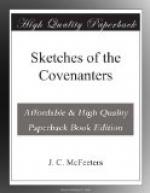A large assembly of Covenanters met at Scone for the crowning of the new king. There was much enthusiasm, yet beneath it all there flowed a deep undercurrent of doubt and fear. Rev. Robert Douglas preached the coronation sermon. The king listened to deep, penetrating, practical words from the Book of God. The Solemn League and Covenant was read. He gave his assent to it with an overflow of vehemence. Archibald Campbell, the Marquis of Argyle, a prominent Covenanter and statesman, then took the crown in both hands, and, lifting it above the prince with great solemnity, placed it upon his head, accompanying the act with an appropriate exhortation. While the oath of office was being administered, the prince kneeled in apparent humility, and lifted up his right hand in a solemn appeal to God. At this point he uttered the awful vow in the presence of the people: “By the Eternal and Almighty God, who liveth and reigneth forever, I shall observe and keep all that is contained in this oath.” He also said: “I will have no enemies, but the enemies of the Covenant—no friends, but the friends of the Covenant.” Thus King Charles II. became a radical Covenanter by profession and protestation in the most solemn manner. Time proved his guilty duplicity.
The English Parliament, after the execution of Charles I., had passed an act making it treason to proclaim this prince king. The Covenanters, having thus elevated Charles to the throne, must now settle accounts with England on the battlefield.
[Illustration: Archbishop sharp
James Sharp was a young Covenanted minister in 1661, but withdrew from the Covenanters and became a persecutor of the most virulent type. The land could not bear his cruelties. He lost his life at the hands of a few men, who had been goaded into desperation by his atrocities. He was slain while driving across Magus moor in 1679.]
Oliver Cromwell invaded Scotland with a strong force, determined to unseat Charles. The Covenanters rallied in defence of their king. Alexander Leslie was once more in command. The two armies were soon facing each other, but hesitated to strike Both armies were made up of soldiers of the cross; both had fought for the Solemn League and Covenant; prayer ascended habitually from both camps; the singing of Psalms aroused the heroic spirit in each. What wonder if they feared the shock of battle! At length Leslie moved down from his advantageous position, and Cromwell ordered an attack. The Covenanters were put to flight with terrible slaughter.
Had the sweet singer of Israel been on the field after the clash of arms, doubtless he would have repeated his wail: “How are the mighty fallen, and the weapons of war perished!” The Covenanters defeated! How! Why! Ah, there was an Achan in the camp. The king was already perfidious in the Covenant. His perfidy had blighted the nation, and smitten the army. Hitherto God had led the armies of the Covenanters; they had won easy victories, and sometimes bloodless triumphs. But now the Lord turns His back upon the banner unfurled for His Crown and Covenant.




